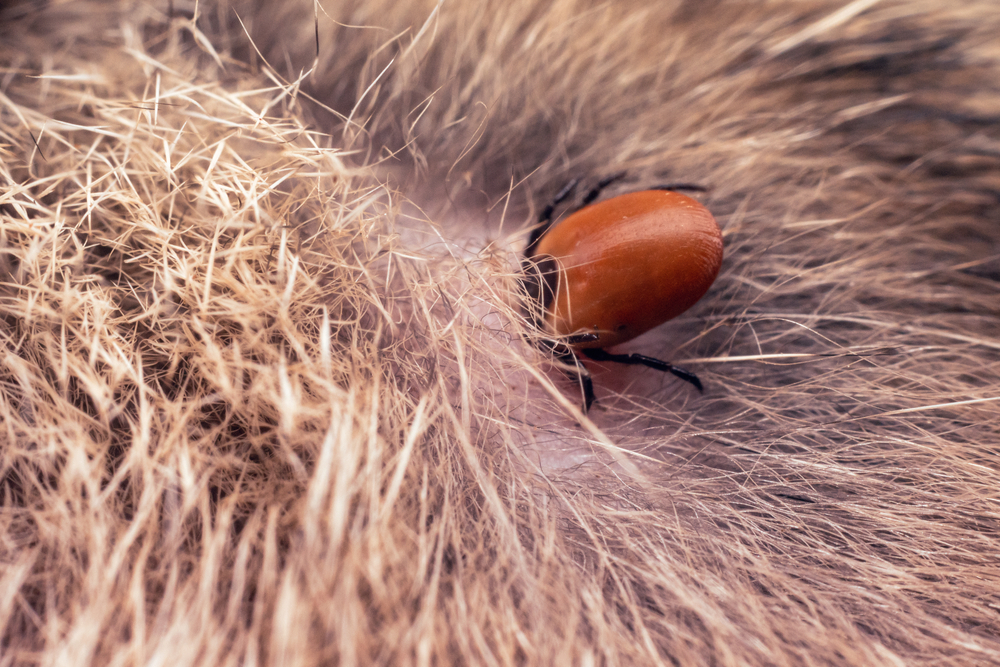No pet owner wants to see fleas, ticks, or other ectoparasites on their beloved pet. Not only can they be uncomfortable for your furry friend, but once carried into your home, they can multiply, and invade carpets, furniture, other pets, and, rarely, people. Fleas can be especially hard to eliminate once they’ve taken comfort in your home, making them a particularly annoying parasite. But, if you think your pets are safe from fleas and ticks because they rarely go outdoors, or because you live in a cooler climate, you may be sadly mistaken. Read on for some important advice about fleas and ticks, and what you can do to prevent them from becoming a problem in your home.
Fleas and ticks are more than a nuisance
Fleas, ticks, mites, and other bugs are not only pesky and annoying—many of them also spread dangerous diseases. Fleas commonly transmit the tapeworm species, Dipylidium caninum, which migrate to the intestinal tract and grow until the host (i.e., your pet) is treated with a specific tapeworm medication. Also, because of their blood-sucking behavior, severe flea infestations can lead to anemia, especially in young puppies and kittens. In dogs, ticks are infamous for spreading blood parasites like Ehrlichia and Anaplasma, which often lead to severe anemia and bleeding disorders. These diseases are so common here in Guam that we recommend screening your dogs and puppies at a very early age. Leaving your furry friend unprotected makes them susceptible to contracting one of these potentially deadly conditions.
Professionals recommend year-round flea and tick prevention
Fleas, ticks, and other pet-loving parasites thrive in hot, humid conditions, making prevention products essential for Guam-dwelling companion animals. But, also, bring your flea and tick preventives with you if you’re planning to travel back to the mainland during the wintry months. Though you’re more likely to deal with a flea or tick problem during the warmer months, most parasites don’t die off, but rather “overwinter” when temperatures drop, meaning they still pose a threat to your pet. Only one unseasonably warm day is enough for these ectoparasites to resume their normal routine—feasting on your pet’s blood.
Combine prevention with annual testing
The Companion Animal Parasite Council (CAPC) recommends year-round parasite prevention for all pets, as well as routine testing for parasite-related diseases. Studies show that tick populations—and the incidence of tick-borne diseases—are on the rise. Tick-borne diseases
can take months after you see a tick on your pet before they show up on a blood test. And, since many affected pets are asymptomatic, screening for disease is an essential part of wellness care. Additionally, fecal testing should be pursued at least annually, to screen for intestinal parasites, one of which is spread by fleas.
Indoor cats and dogs also need parasite prevention
It’s not surprising that indoor cat and dog owners often believe their pets aren’t at risk for fleas or ticks, since they don’t step foot outdoors. While their risk is reduced, fleas can hitch a ride on another pet in the home who wanders outdoors, or on a two-legged family member, eventually bringing parasites to other pets in the home. The occasional, short stroll in the garden exposes your pet to undesirable bugs, so keep them protected with an easy-to-use product.
Plenty of convenient flea and tick prevention options exist

Fortunately, protecting your pet is easier than ever, thanks to a plethora of parasite prevention products. Effective control requires dosing every month. Our experience has found that topical liquids for cats and a monthly pill for dogs (i.e., flea, tick, heartworm, and internal parasites all in one) are the most effective treatments to prevent fleas and ticks here on Guam. Remember, never administer to cats a flea or tick preventive intended for dogs, as this may lead to serious health problems. For advice on choosing the best prevention product for your pet, contact the Guam Pet Hospital veterinary team.
At Guam Pet Hospital, we are dedicated to the well-being of your beloved pets. That’s why we recommend the gold standard of preventive care, which includes year-round parasite control, and annual testing for tick-borne diseases and intestinal parasites. Contact us, to find out if your pet is due for these services, or to pick up a refill of your favorite parasite prevention product today.








Leave A Comment